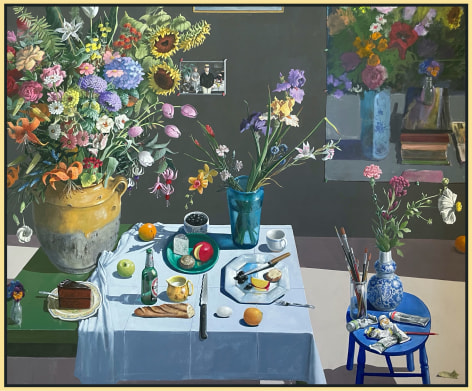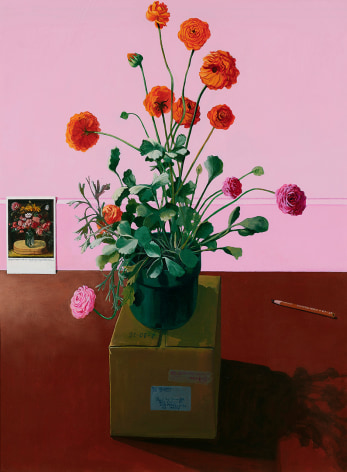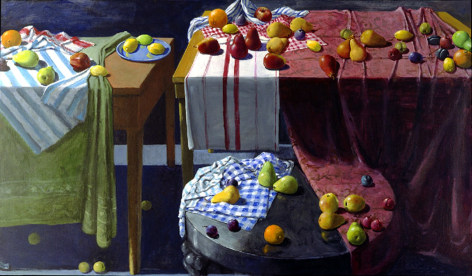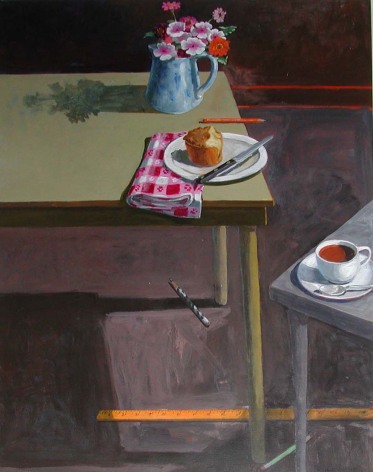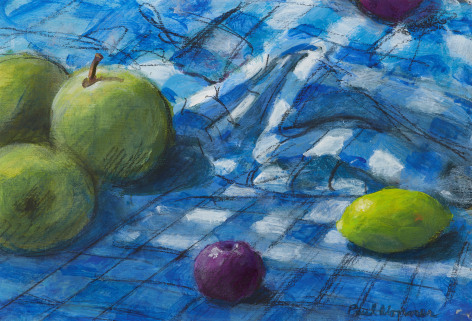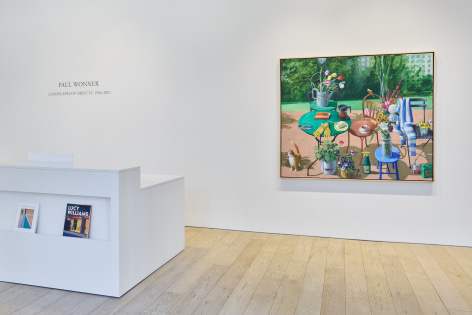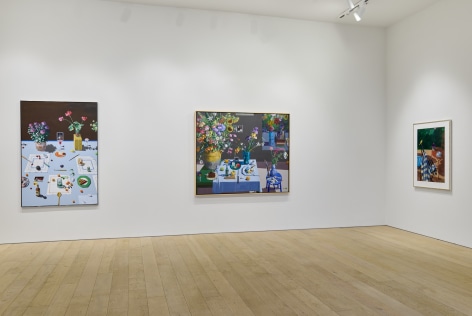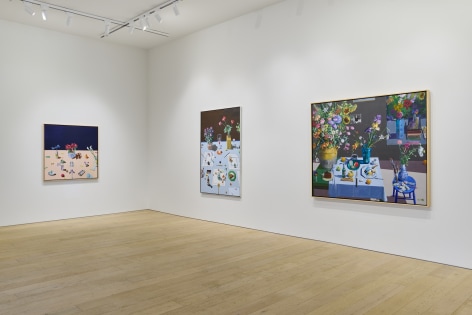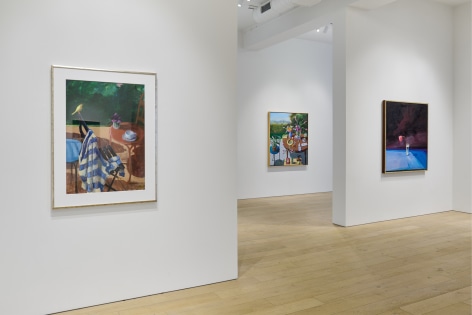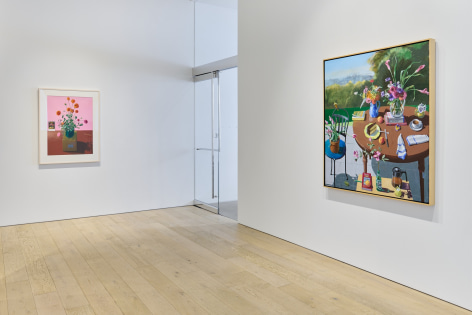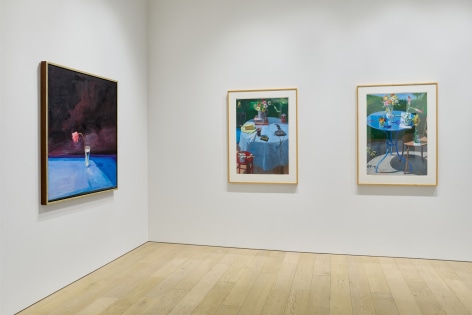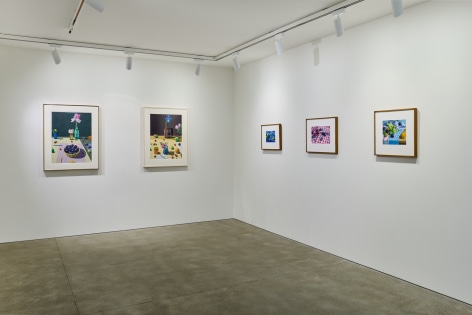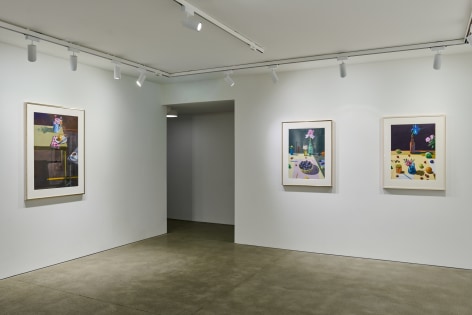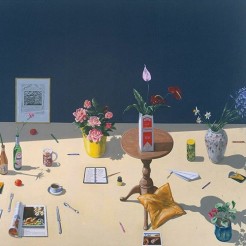Berggruen Gallery is pleased to present Paul Wonner: Landscapes of Objects, 1966-2001, an exhibition of works by American artist Paul Wonner. This show marks his thirteenth solo exhibition with the gallery. Landscapes of Objects, 1966-2001, is a celebration of Wonner’s connection to Berggruen Gallery, and his work’s importance among prominent California collections. Paul Wonner’s first exhibition with Berggruen Gallery in 1978 was a presentation of his meticulous still life paintings. This show honors his legacy at the gallery and presents the opportunity to view a range of his career defining, still life oeuvre. The exhibition will be on view from April 28 through June 4, 2022.
Paul Wonner was a distinguished American painter who keenly explored the fluidity between abstraction and realism throughout his prolific career. This exhibition highlights his still life paintings and works on paper and brings together large-scale pieces from various California collections. This group of works, dating between 1966 and 2001, distinctively marks a pivotal bend in Wonner’s career: the artist’s illustrious turn towards Abstract Realism and his acclaimed landscapes of objects.
Born in Arizona in 1920, Paul Wonner received much of his art training in the Bay Area. After completing his undergraduate degree at the California College of Arts and Crafts, now CCA, in 1941 and following his service in the US Army in 1946, Wonner embarked on his professional commitment to art. He began his career in New York, at the height of Abstract Expressionism in the late 1940s. His early work reflects the energetic brushstrokes and strong coloring characteristics of the movement. Yet, his abstracted paintings remained attentive to recognizable phenomenons and wonders—the shifting patterns of light, the evoking moods of weather, and the spatial effects of figures cast in shadow. In 1950, Wonner returned to the Bay Area to receive his Master of Art from the University of California, Berkeley. He received guidance and encouragement from artists including Richard Diebenkorn, David Park, and Elmer Bischoff. Two defining features of the Bay Area Figurative Movement, the attention to the characterizing texture of paint and a close observation of a subject’s presence in space, resonated with Wonner, and ignited his own significant contributions to the movement.
Art Historian Caroline A. Jones recognized Paul Wonner and fellow California artists, Theophilus Brown and Nathan Oliveira, as the Bridge Generation, highlighting their continuation in the Bay Area Figurative Movement’s creative path, yet their progressive stretch of medium limits. Where some artists delved into studies of abstraction, Wonner dedicated himself to the close observation of the representational world. In his 1966/67 painting Tulip, Wonner depicts a single pink tulip in a glass vase. By reducing the composition and focusing on the flower and vase, he creates atmosphere and depth through a descending cast of blue shadows. This painting reflects the lighting and spatial structure of the Bay Area Figurative movement yet offers foresight to his ensuing attention to the still life genre.
Paul Wonner’s stylistic shift to overt still life painting in the 1970s reasserted his fascination with the parameters of realism. In Imaginary Still Life with Slice of Cheese Wonner astutely paints a series of objects, separated in space. From the lattice crust of the pie to the detailed, pictorial vase, Wonner showcases his high level of painterly skill. Yet his representational paintings have immense evocative potential. His work combines hyperrealist observation with a pervading sense of reminiscence, and story. Study with Fruit and Flowers poetically invites an audience to the pencil and paper and a playful array of objects. His staged fruit are individually presented, yet harmoniously assemble into visual performances.
Wonner masterfully constructs his landscapes of objects, creating subtle contradictions in space to keep curiosity afloat. His tabletop scenes often intersect a surface in the foreground with a firm horizon line behind. In Studio: Two Tables Popover and Coffee, Wonner creates space through shapes found among household objects; the circle of a coffee cup, the flatness of a ruler, or the length of kitchen knife. He balances structure with new inventions and twists on perspectival conformities. In his acrylic on paper, Fruit and Kitchen Towels (Green cloth), Wonner uses the sharp angles of the scene’s table to construct an unusual point of view, and a dialogue for his everyday objects.
Paul Wonner’s large-scale painting Garden Terrace presents his late career, complex still-life constructions. His 1997 painting overlaps a populated scene of garden tools, animals, and elaborate flower bouquets atop a terraced lawn. This whimsy setting asks of a wandering gaze and presents the multitude of dimensions found within Wonner’s work. Landscapes of Objects, 1966-2001, highlights these lively scenes, the breadth of the artist’s imagination, and his works prominence within the story of Bay Area art.
Paul Wonner was a distinguished artist and major museums throughout the United States have collected his work. He had numerous solo exhibitions in New York, Los Angeles, and San Francisco. In 1981, the San Francisco Museum of Modern Art organized a traveling retrospective of his work entitled Paul Wonner: Abstract Realist. Paul Wonner's work is represented in public collections such as the Museum of Modern Art, the Metropolitan Museum of Art, the Solomon R. Guggenheim Museum, and the Whitney Museum of Modern Art in New York City, the San Francisco Museum of Modern Art and the Fine Arts Museums of San Francisco, the Art Institute of Chicago, the Boston Museum of Fine Art, the National Museum of American Art in Washington D.C., and the Hirshhorn Museum and Sculpture Garden, also in Washington D.C. Paul Wonner passed away in 2008 in San Francisco.
Paul Wonner: Landscapes of Objects, 1966-2001, April 28 – June 4, 2022. On view at 10 Hawthorne Street, San Francisco, CA 94105. Images and preview are available upon request. For all inquiries, please contact the gallery by phone (415) 781-4629 or by email info@berggruen.com.

